Table of Contents
Today, customers have come to expect quick, reliable, and transparent delivery services. This technology ensures small businesses meet those expectations, enhancing customer satisfaction and driving growth. In doing so, courier software for small businesses plays a crucial role.
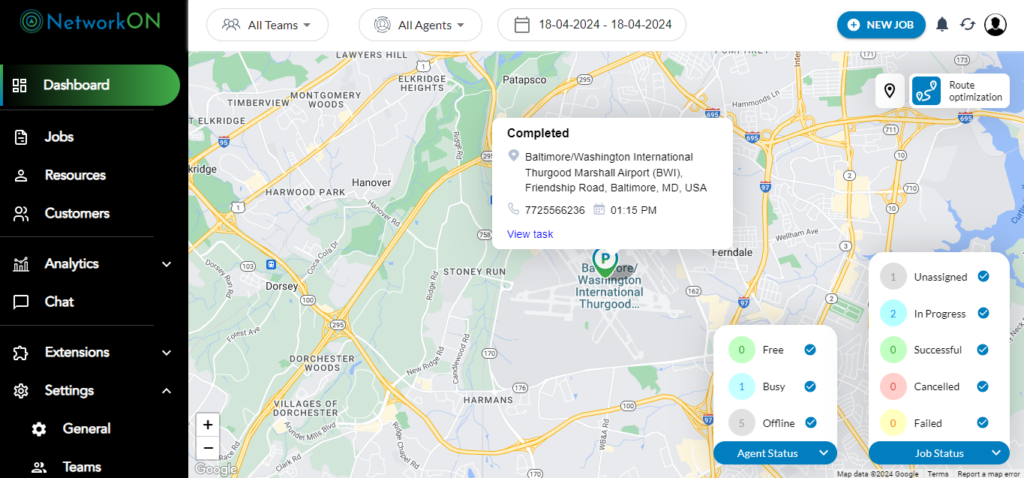
Small business owners are discovering that courier software for small businesses is a game-changer, streamlining delivery services to achieve significant cost-efficiency and time savings. By optimizing dispatch, route planning, and real-time tracking, these innovative solutions reduce overhead and boost their teams’ productivity to new heights. Adopting advanced courier software equips companies with the agility needed to carve out a distinctive competitive edge in the market.
Dynamic courier software meets these expectations, fostering customer loyalty and business growth. Embracing this technological leverage positions small businesses to thrive in a crowded marketplace.
Features of Effective Courier Software
Success in the delivery industry hinges on efficiency and reliability. Courier software designed for small businesses must encapsulate features that directly enhance operational capabilities. A user-friendly interface ensures managers and staff can easily navigate the system, reducing the learning curve and accelerating the workflow.
Real-time tracking capabilities form a cornerstone of modern courier software. Customers expect accurate estimates and updates on the whereabouts of their deliveries. This transparency fosters trust and increases customer satisfaction. From the business perspective, it allows for optimizing delivery routes and managing the fleet in real-time.
Automation is another key facet, particularly automated dispatch and delivery scheduling. These features streamline the process from the moment an order is received to the point of delivery. The sophistication inherent in automated systems can save countless hours of manual coordination and mitigate the risk of human error, which translates to higher productivity and reduced overhead costs.
- Software that is easy to navigate can lead to a more productive workforce.
- Tracking in real-time empowers businesses and customers alike with valuable information.
- Automated dispatching and scheduling optimize resource allocation and efficiency.
Maximize Efficiency and Satisfaction: The Advantages of Courier Software
Courier software for small businesses is a robust platform designed to streamline the complex order management process. With real-time data and organizational tools, business owners can effortlessly oversee orders from the point of reception to the final delivery. This efficiency level typically increases the volume of orders that can be managed simultaneously without compromising accuracy or speed.
Drivers become more effective and accountable when courier software is part of their toolkit. The software provides them with optimal routes, delivery schedules, and instant communication capabilities, which significantly reduces the chances of errors and delays. As a result, the time it takes to complete deliveries improves noticeably, thereby increasing the number of deliveries a driver can manage within a given timeframe.
Customers often cite the accuracy of delivery times as a fundamental aspect of their satisfaction. Courier software addresses this by providing precise estimated time of arrival (ETA) predictions based on traffic conditions, distance, and other real-time factors. A customer awaiting a package can stay informed about its location and ETA, leading to a more trusting and transparent relationship between the customer and the business.
Cost Analysis of Courier Software Solutions
When considering courier software for a small business, analyze the initial investment against potential long-term savings. Examine subscription models alongside one-time purchase costs. Above all, scrutinize different courier software solutions’ possible return on investment (ROI).
Initial Investment vs. Long-Term Savings
Factoring the initial investment in courier software involves assessing upfront costs such as licensing, implementation, and training. Yet, businesses must juxtapose these with the anticipated long-term savings, reductions in manual labor, operational efficiency, and decreased errors that contribute to these savings.
Subscription Models Versus One-time Purchase Costs
The market presents subscription-based models, typically entailing monthly or annual payments and one-time purchase options. Subscription services often include continual updates and customer support. In contrast, one-time purchases may incur additional updates and technical assistance costs.
Return on Investment (ROI) Considerations
Consider the qualitative and quantitative benefits a courier software will deliver. Quantitatively, calculate the software’s ROI by comparing the investment against metrics like decreased delivery times, lower fuel expenditures, and increased delivery capacity. Qualitatively, improved customer satisfaction and team morale should also be factors in ROI considerations.
- Estimate the total cost of ownership over a software’s lifecycle.
- Query how integration with existing systems may mitigate or raise initial costs.
- Probe if vendor flexibility exists in pricing or if scalable options that align with business growth are offered.
Maximize Delivery Efficiency with Superior Courier Software
Courier software is the lynchpin for the seamless operation of small business delivery systems. Its influence on efficiency resonates through every step of the courier process, ensuring businesses stay ahead in fast-paced markets.
Streamlined Route Optimization for Drivers
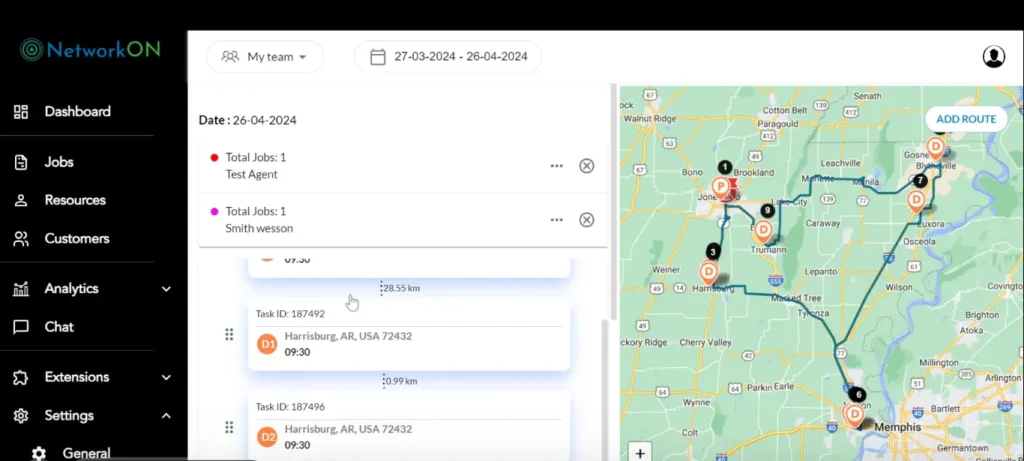
Dynamic route optimization within courier software reduces delivery time by calculating the most efficient paths. Drivers receive updates in real-time, navigating traffic delays or construction zones, which conserves fuel and maximizes the number of deliveries completed within a day.
Minimizing Manual Errors in Dispatch and Delivery
Digitizing dispatch and delivery processes mitigates risks associated with human error. Courier software automates order input, label printing, and dispatching, ensuring information accuracy and improving delivery services’ reliability.
Enhanced Turnover Rates for Delivery Tasks
Task turnover rates accelerate when courier software for small businesses is deployed. This system precisely coordinates pickups and deliveries, providing clear instructions and expectations for each delivery task. Drivers handle more deliveries efficiently, while businesses can take on an increased volume of orders.
A glance at the nuances of courier software reveals a transformative potential for delivery workflows. When tailored to the unique needs of a small enterprise, such technology becomes an invaluable tool in fortifying its competitive edge.
Customization Options for Courier Software
Every small business operates with its own unique set of processes and challenges. A fixed, one-size-fits-all courier software solution may not align with each enterprise’s specific demands and identity. Recognizing this, developers offer customization options that allow businesses to modify and tailor the software according to their requirements.
Choosing courier software that allows a business to adjust specific features means the business can adapt the tool to serve distinct operational workflows. These tailor-made solutions enable efficient management of day-to-day tasks while mirroring the company’s operational philosophy and strategy.
Another aspect of customization involves branding. Companies can infuse courier software with their brand’s colors, logos, and themes, strengthening brand identity and offering a more cohesive experience for customers and staff. This seamless branding extends beyond aesthetic appeal, forging a stronger connection with users and promoting brand consistency across all digital platforms.
Custom workflows are often crucial for businesses with unique logistic requirements or distinctive processing rules. Advanced courier software enables firms to design these custom workflows, allowing comprehensive control over how orders are received, processed, dispatched, and delivered.
- The software can adapt to the decision-making hierarchy within a business, providing different access levels and permissions.
- Rules can be set to automate the sorting and routing of orders based on predefined criteria, such as size, location, or delivery timeframes.
- Communications can be customized, sending tailored notifications and alerts to customers and staff based on the status and handling of shipments.
With software that supports customization, incorporating business-specific pricing models, discounts, or service levels becomes simpler. The software can evolve concurrently as the business grows or changes, ensuring that the digital infrastructure supports the operational trajectory without frequent replacements or cumbersome workarounds.
Responsive customer portals can be designed to reflect the interactive manner in which a business wishes to engage with its clients, further enhancing the customer experience. This capability for nuanced design ensures that each client interaction reinforces the company’s commitment to quality service.
Offering a platform for feedback loops, courier software with customization features allows businesses to rapidly implement improvements based on customer and courier insights, maintaining a dynamic approach to service delivery and continuous improvement.
Streamlining Order Management with Courier Software
Courier software transcends traditional boundaries in order management, offering seamless integration with many e-commerce platforms. This integration allows for a unified interface where all orders are funneled into one manageable location. Businesses witness their ordering processes dramatically simplified, which boosts operational efficiency. By harnessing this technology, small businesses can keep pace with larger competitors, adapting quickly to market demands without disproportionate increases in administrative costs. Courier software for small businesses is a tool and a strategic partner in orchestrating order workflows.
Integrating with e-commerce platforms
Connecting courier software with e-commerce platforms means that order details are automatically captured once a customer completes a purchase. This immediate synchronization eliminates manual data entry and reduces the margin for error. Stock levels are updated in real time, ensuring that inventory is always accurate, which prevents the sale of out-of-stock items and contributes to a positive customer shopping experience.
Managing bulk orders and complex delivery requirements
Courier software stands out for businesses handling sizable order volumes or those with intricate delivery prerequisites. Users can effortlessly sort orders into batches for efficient processing, arrange deliveries based on optimized routes, and generate necessary documentation. Suppose an order has specific handling needs, such as refrigeration or fragile care. In that case, the software can flag and communicate those requirements through the delivery chain. Real-time adjustments become straightforward, allowing for dynamic responses to logistical challenges. The result is a reliable, mistake-free service that maintains consistency despite escalating order complexity.
Mobile Applications for On-the-Go Courier Management
Efficient delivery services rely on seamless operation and accessibility, which mobile applications for courier management provide. These apps serve as indispensable tools for both drivers and management teams. By leveraging mobile technology, courier businesses expedite deliveries, manage routes, and track parcels faster. Mobile apps enable drivers to receive route updates, confirm pickups and deliveries, and communicate with dispatchers from any location.
Accessibility features in mobile courier software eliminate barriers, enabling immediate access to critical information and functionality. Drivers manage their deliveries on the move, while back-office staff oversee operations from any location with internet access. This ubiquitous access ensures updates are reflected in real-time, creating a dynamic and responsive delivery process that responds swiftly to real-world changes.
The bond between agile operation and mobile technology cannot be understated in modern courier services. By embracing mobile applications, small businesses ensure they are on the leading edge of responsiveness and efficiency in an industry where timing and accuracy are inseparable from success.
Implementing Real-Time Tracking with Courier Software
Real-time tracking is a distinctive feature of courier software, delivering substantial benefits to businesses and their clientele. With this functionality, companies can monitor deliveries meticulously, thereby optimizing operational efficiency and fostering transparency for customers. Consumers, in turn, experience heightened peace of mind and satisfaction through the ability to track their orders with precision from dispatch to delivery.
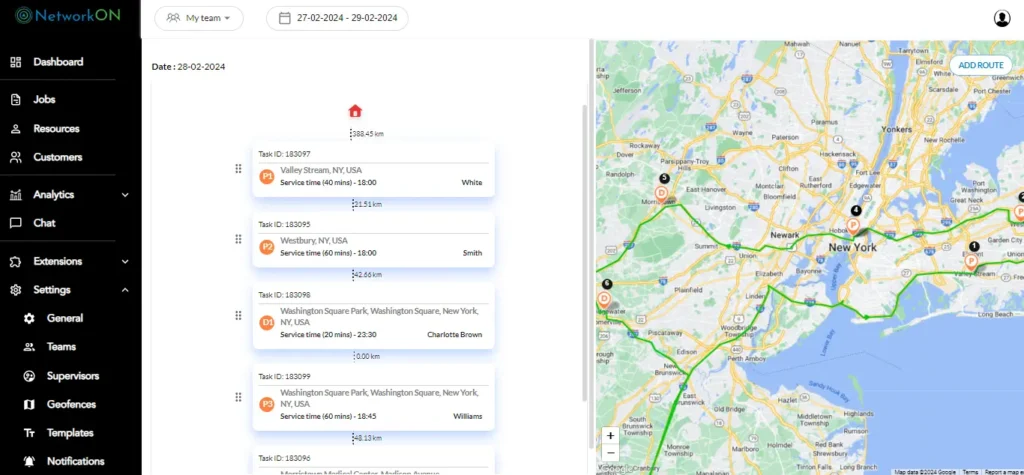
The backbone of real-time tracking technology is an intricate alliance of GPS, mobile connectivity, and sophisticated algorithmic processing. When a delivery starts, the courier software captures the GPS data from the drivers’ devices and transmits this information through mobile networks.
Sophisticated algorithms process the incoming data, updating the delivery status and projecting delivery time estimates. Customers access this information via user interfaces, often provided as web or mobile applications, which enhances user understanding and trust in the service.
- Businesses harness real-time tracking to streamline their operational workflows.
- Customers receive instant access to delivery updates, fostering trust and a sense of control over their orders.
- Technology like GPS and mobile networks interlinks, providing seamless updates on the whereabouts of a parcel or product.
- The combination of real-time data and predictive analytics paves the way for accurate delivery time estimates.
- Customer-facing interfaces translate the technical data into an easily digestible format, enhancing the overall customer experience.
By introducing real-time tracking in courier software, service providers and consumers enjoy a higher level of engagement with the parcel delivery process. This feature raises the standard of customer service. It positions a business as a reliable entity capable of managing logistical operations with advanced technological aid.
Enhancing Customer Experience with Courier Software
Investing in advanced courier software transforms the customer experience dramatically. By streamlining the order placement and monitoring process, customers enjoy a marked increase in convenience. Software that is intuitive and accessible reduces friction, encouraging repeat business. Seamless integration into a business’s service offering compels customers to appreciate the efficiency and professionalism it entails.
Transparency is a fundamental aspect of customer satisfaction. Courier software provides real-time updates on parcel location, heightening trust between the courier service and the customer. Advanced systems offer predictive delivery times, further bolstering customer confidence.
Open communication channels are the backbone of exceptional customer service. Courier software frequently includes features like automated notifications and direct messaging, which keep customers well-informed. These proactive updates about delivery statuses, potential delays, or problems encountered during shipment ensure that customers know the whereabouts of their orders.
Diverse customers have varied preferences; some prefer direct email communication, while others opt for text messages or app notifications. A robust courier software caters to these preferences, offering multiple communication modalities to match customer expectations.
- Allows customers to choose their preferred method of communication
- Provides an account of the package’s journey
- Offers accurate estimates of delivery times
- Enables quick resolution of delivery issues through direct contact points
Moreover, the software’s utility extends beyond the delivery itself. Including feedback mechanisms within the software aids businesses in capturing customer sentiments. This feedback can drive improvements in service quality, leading to heightened customer loyalty and positive word-of-mouth.
Security Concerns in Courier Software
In the digital era, safeguarding confidential information remains non-negotiable. Protecting sensitive customer data for courier services must be a core tenet of their operation, as breaches can lead to significant financial losses and erosion of customer trust. Effective courier software systems encrypt customer data, ensuring that personal details, payment information, and order specifics stay secure from unauthorized access.
- Encryption Techniques: Advanced encryption standards are a common method of preventing data breaches. Strong encryption secures data transfer between the server and clients.
- User Authentication Protocols: Software solutions often incorporate multi-factor authentication, demanding more than one piece of evidence before granting user access, thereby reducing the risk of unauthorized data manipulation.
Comprehensive measures are in place within dependable courier software to ensure the safety of drivers and delivery information. Location and route data for delivery personnel are sensitive and critical to business operations. Systems employ robust mechanisms to ensure driving routes, schedules, and personal information remain accessible only to authorized personnel.
Data Analytics and Reporting in Courier Software
Data analytics and reporting capabilities transform raw delivery data into actionable insights. Courier software provides dashboards that display key performance indicators, helping businesses monitor their operational efficiency. The software tracks delivery times, success rates, and customer feedback, which guide strategic decisions to enhance service quality.
Real-time analytics notify businesses of ongoing processes, enabling immediate responses to potential issues. Historical reports establish longer-term patterns, revealing opportunities for cost-saving measures such as optimizing routes or adjusting staffing levels. Advanced reporting features can predict trends, allowing companies to adjust their business strategies proactively.
- Dashboard visualizations aid in identifying real-time operational bottlenecks.
- Predictive analytics empower businesses to adapt to market changes efficiently.
- Customizable reports adhere to specific business needs and goals.
When businesses harness the full potential of data analytics and reporting features in courier software, they position themselves to exceed customer expectations and strengthen their competitive edge in the marketplace.
Seamless System Integration: Courier Software Amplifies Business Operations
Effortless synchronization with existing frameworks transforms how small businesses manage their operations. Recognizing how courier software aligns with accounting systems and customer relationship management (CRM) platforms unlocks the potential for streamlined business processes. These integrations simplify financial oversight, improve customer engagement, and eliminate redundant data entry, accelerating task completion across various departments.
Confluence with Accounting and CRM Platforms
Courier software automatically records financial transactions related to shipments by connecting with leading accounting software. The instant capture of cost, revenue, and tax information facilitates accurate bookkeeping. Similarly, integration with CRM systems enriches customer profiles by adding shipping data. This information affords sales and service teams valuable insights into customer preferences and order histories.
Streamlining Business Workflows
Merging courier software with other business systems enhances efficiency at every turn. Tasks previously segmented among different software suites can now be managed from a unified interface. Consequently, employees navigate fewer platforms, reducing the learning curve and minimizing the risk of errors. Overall, the integration optimizes resources and sharpens competitive edges.
- Accounting software amalgamation translates into real-time financial updates, aiding swift decision-making.
- CRM integration provides a holistic view of the customer journey, fostering personalized interactions.
Considerations for Selecting the Right Courier Software
The selection of courier software for small businesses significantly impacts their operational efficiency. Decisions must comprehensively appreciate the business’s scale, financial scope, and specialized requirements. Companies need software that aligns with their objectives, enhances their capabilities, and scales as they expand. Examination of customer support and the availability of training from potential software providers equally bear on the success of the software implementation.
- Assess Business Size and Needs: Ensure the courier software can accommodate your business’s size and specific operational requirements.
- Consider Budget and ROI: Evaluate the budget and long-term return on investment, balancing immediate cost savings and future scalability.
- Evaluate Customer Support: Check provider reputations for responsive customer support and comprehensive training to ensure smooth transitions.
- Plan for Short-term and Long-term Goals: Integrate short-term needs and long-term goals into the decision-making process for a tailored software selection.
The Role of Artificial Intelligence and Machine Learning in Courier Software
Advancements in technology have streamlined many aspects of courier software for small businesses. One notable development is the integration of artificial intelligence (AI) and machine learning (ML) algorithms within courier software systems. These technologies transform conventional software into dynamic tools capable of learning from data, predicting trends, and enhancing operational insights.
Machine learning improves demand forecasting, a complex challenge for small businesses. ML models can accurately predict future demand by analyzing historical data, seasonality, and buying patterns. Precise demand forecasts equip businesses to optimize inventory levels, schedule deliveries, and manage resources efficiently, thus reducing operational costs and improving customer satisfaction.
AI plays a pivotal role in customer interaction, with automated chatbots providing immediate responses to customer inquiries. These chatbots understand natural language and can learn from interactions to provide better service over time. They handle routine tasks such as tracking order status, processing returns, and answering frequently asked questions, freeing human customer service agents to tackle more complex issues.
While AI and machine learning bring undeniable advantages, their successful implementation necessitates a robust data infrastructure. Small businesses adopting these technologies must ensure that their courier software can handle the data processing demands of AI and ML algorithms.
Compliance and Regulatory Requirements in Courier Software
The landscape of delivery services demands adherence to stringent regulatory and compliance measures. Courier software for small businesses is a logistical tool and a guardian of legal conformity. By automating processes and maintaining records, such software safeguards businesses from potential legal complications.
Data privacy is at the forefront of regulatory concerns. Courier software regularly interfaces with personal customer information, necessitating a structure compatible with laws like the General Data Protection Regulation (GDPR). Through effective software, small businesses can ensure that they handle sensitive data with the requisite level of security and privacy, thereby maintaining trust and integrity.
Courier software for small businesses typically integrates real-time tracking and mobile capability features. These fertilize the ground for industry-specific compliance, from transportation laws to international shipping regulations. The ability to document the chain of custody and maintain precise logs of delivery routes and times enables companies to comply with laws and industry standards.
The evolution of courier software continues to reflect changes in regulatory landscapes, accommodating new requirements as they emerge. For a small business, aligning with a software solution prioritizes compliance and translates into seamless operations free from legal hindrances.
Key Takeaways
- Efficiency and Cost Savings: Courier software streamlines dispatch, route planning, and tracking, reducing costs and increasing productivity through automation.
- Enhanced Customer Experience: Real-time tracking and accurate ETA predictions improve transparency and customer satisfaction, fostering trust and loyalty.
- Customization and Integration: Tailored workflows, branding options, and seamless integration with e-commerce, accounting, and CRM systems boost operational efficiency.
- Data Analytics and Reporting: Robust analytics turn raw data into actionable insights, helping businesses monitor performance, predict trends, and make informed decisions.
- Security and Compliance: Encryption and multi-factor authentication protect sensitive data, while compliance with regulations like GDPR ensures legal safety and maintains customer trust.
Conclusion
Small businesses stand on the cusp of transformation when they adopt the right courier software. This software offers a trove of capabilities, from simplifying order management to enabling real-time package tracking. With this array of features at their disposal, businesses cater to the escalating expectations of a tech-savvy customer base and enhance the precision of their service delivery.
An investment in courier software aligns with the objective of seamless scalability while guarding against vulnerabilities inherent in online operations. Data analytics and advanced reporting within these platforms empower businesses with actionable insights, driving strategic decisions and fostering growth.
Melding artificial intelligence and machine learning technologies into courier software reshapes the landscape for small businesses by automating critical processes and predicting future trends. This synergy provides a competitive edge in an increasingly demanding agility and personalization market.
Elevate your small business to new heights with NetworkON’s courier software for small businesses. Embrace technology that delivers flexibility, efficiency, and data-driven management. Upgrade your operations and stay ahead of the competition.
Leap today and transform your small business with NetworkON!
Frequently Asked Questions
How does courier software improve efficiency and reduce costs for small businesses?
Courier software streamlines processes like dispatch, route planning, and real-time tracking. Automation reduces manual labor and errors, leading to significant cost savings and increased productivity.
What features in courier software enhance customer satisfaction?
Key features include real-time tracking, accurate ETA predictions, and automated notifications. These improve transparency and keep customers informed, fostering trust and loyalty.
Can courier software be customized to fit my business needs?
Effective courier software offers customization options for workflows, branding, and communication preferences. It also integrates seamlessly with e-commerce, accounting, and CRM platforms to enhance efficiency.
How does courier software ensure data security and compliance?
Courier software protects sensitive information with encryption and multi-factor authentication. It also adheres to regulatory requirements like GDPR, ensuring legal compliance and maintaining customer trust.


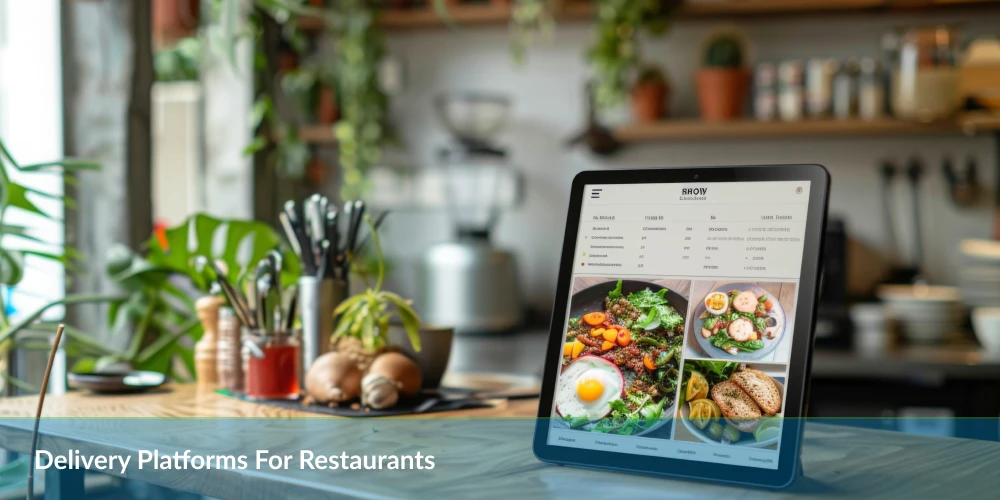

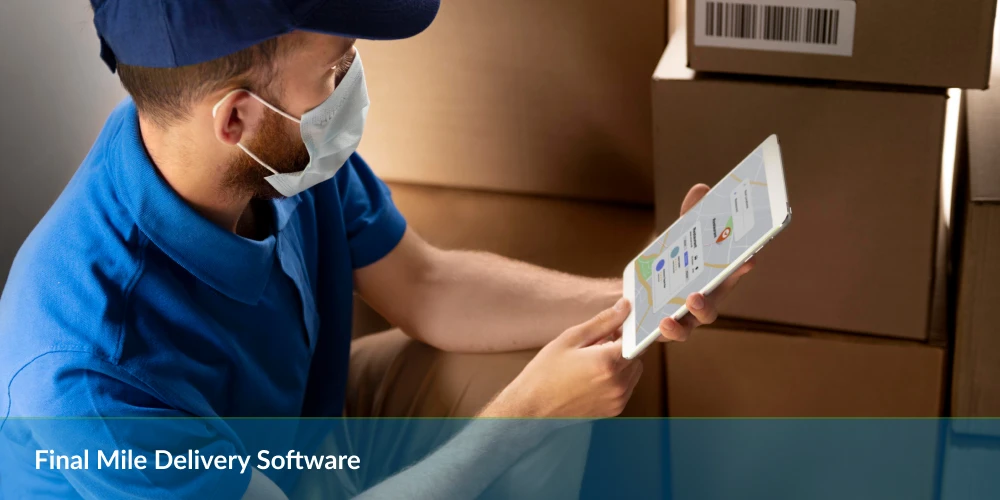
0 Conversations